

This includes the ability of meeting basic needs, learning, growing, making decisions, being mobile, building and maintaining relationships; and contributing to society.
Source: World Health Organization (WHO)
Regular exercise changes the brain to improve memory, thinking skills. Regular exercise changes the brain to improve memory, thinking skills.
There are plenty of good reasons to be physically active.
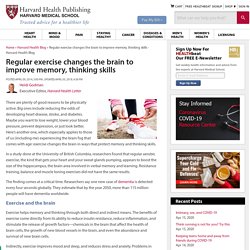
Research Article: Exercise training increases size of hippocampus and improves memory. Brain health rests on heart health: Guidelines for lifestyle changes. Brain health rests on heart health: Guidelines for lifestyle changes. Right now the world is experiencing an epidemic that is projected to get much, much worse.
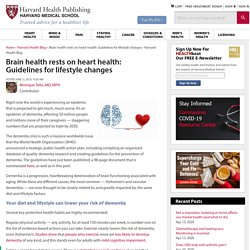
Protecting against cognitive decline. While there's currently no treatment that can prevent or cure dementia, researchers have identified some factors that may help protect you from cognitive decline.
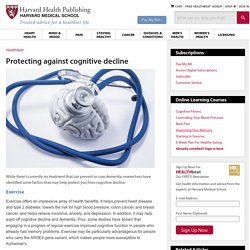
Exercise Exercise offers an impressive array of health benefits. It helps prevent heart disease and type 2 diabetes; lowers the risk for high blood pressure, colon cancer, and breast cancer; and helps relieve insomnia, anxiety, and depression. In addition, it may help ward off cognitive decline and dementia. Plus, some studies have shown that engaging in a program of regular exercise improved cognitive function in people who already had memory problems. A Mediterranean-style diet. Physical activity and motor ability associated with better cognition in older adults, even with dementia. Encouraging evidence indicates that being more physically active is associated with a lower risk of Alzheimer’s disease and a slower rate of cognitive decline in older adults.
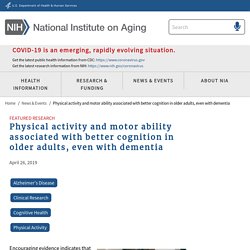
But it remains unclear exactly how physical activity lowers this risk for Alzheimer’s disease. One theory is that physical activity is somehow preventing the formation of the damaging plaques and tangles that are the hallmark of Alzheimer’s. Alternatively, perhaps being more physically active may simply improve or maintain the ability to function in the face of accumulating brain damage from Alzheimer’s disease, a concept sometimes referred to as cognitive resilience. A recent study by NIA-funded researchers at Rush University aimed to test these two theories, finding an association between motor abilities and cognitive test performance, as well as a separate independent association between physical activity and cognitive performance.
There are some limitations to this study. Reference: Buchman AS, et al. Do Memory Problems Always Mean Alzheimer's Disease? Many people worry about becoming forgetful.
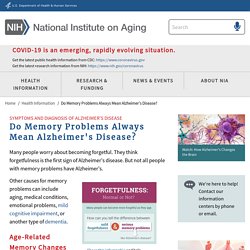
They think forgetfulness is the first sign of Alzheimer's disease. But not all people with memory problems have Alzheimer's. What Is Mild Cognitive Impairment? Some people with memory problems have a condition called mild cognitive impairment, or MCI.
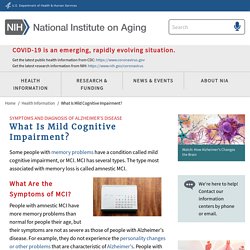
MCI has several types. The type most associated with memory loss is called amnestic MCI. What Are the Symptoms of MCI? How Alzheimer's Changes the Brain. Dementia In Brief. Dementia - Symptoms, Stages, Treatment & Prevention. Dementia is a syndrome – usually of a chronic or progressive nature – in which there is deterioration in cognitive function (i.e. the ability to process thought) beyond what might be expected from normal ageing.
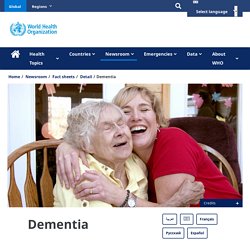
It affects memory, thinking, orientation, comprehension, calculation, learning capacity, language, and judgement. Consciousness is not affected. WHO Global Health Statistics 2016. The Top 10 Causes of Death. Of the 56.9 million deaths worldwide in 2016, more than half (54%) were due to the top 10 causes. Ischaemic heart disease and stroke are the world’s biggest killers, accounting for a combined 15.2 million deaths in 2016.
These diseases have remained the leading causes of death globally in the last 15 years. Chronic obstructive pulmonary disease claimed 3.0 million lives in 2016, while lung cancer (along with trachea and bronchus cancers) caused 1.7 million deaths. Diabetes killed 1.6 million people in 2016, up from less than 1 million in 2000. Deaths due to dementias more than doubled between 2000 and 2016, making it the 5th leading cause of global deaths in 2016 compared to 14th in 2000. Lower respiratory infections remained the most deadly communicable disease, causing 3.0 million deaths worldwide in 2016. Road injuries killed 1.4 million people in 2016, about three-quarters (74%) of whom were men and boys.
Leading causes of death by economy income group. Adopting a healthy lifestyle helps reduce the risk of dementia. 14 May 2019 – People can reduce their risk of dementia by getting regular exercise, not smoking, avoiding harmful use of alcohol, controlling their weight, eating a healthy diet, and maintaining healthy blood pressure, cholesterol and blood sugar levels, according to new guidelines issued by the World Health Organization (WHO) today.
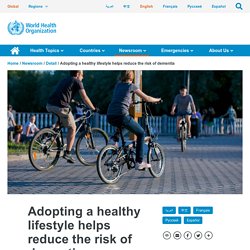
“In the next 30 years, the number of people with dementia is expected to triple,” said WHO Director-General Dr Tedros Adhanom Ghebreyesus. “We need to do everything we can to reduce our risk of dementia. The scientific evidence gathered for these Guidelines confirm what we have suspected for some time, that what is good for our heart, is also good for our brain.” The Guidelines provide the knowledge base for health-care providers to advise patients on what they can do to help prevent cognitive decline and dementia. iSupport is currently being used in eight countries, with more expected to follow. Dementia: a rapidly growing public health problem. Cognitive Health and Older Adults. Cognitive health—the ability to clearly think, learn, and remember—is an important component of brain health.
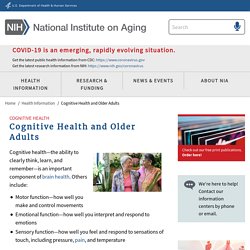
Others include: Participating in Activities You Enjoy. There are many things you can do to help yourself age well: exercise and be physically active, make healthy food choices, and don’t smoke.
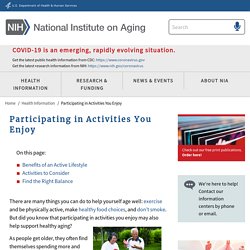
But did you know that participating in activities you enjoy may also help support healthy aging? As people get older, they often find themselves spending more and more time at home alone. The isolation can lead to depression and is not good for your health. If you find yourself spending a lot of time alone, try adding a volunteer or social activity to your routine. People's Association. Senior Citizens' Executive Committees PA Senior Citizens’ Executive Committees (SCECs) is the largest seniors’ network in Singapore. Through this network, the SCEC plans and organises a wide array of activities and courses to enrich the life experiences of senior citizens. There are sports and dance activities that are specially designed to help participants stay fit and healthy. There are also courses that fulfill the pursuit of lifelong learning by offering skills to pick up a new language, improve one's cooking, and even explore the possibilities of computer technology.
Stay Healthy in Your Neighbourhood! - English Ver. 6 Best Cognitive Games and Activities for Seniors. Has a senior loved one struggled to recall the name of an old friend or remember the street that their first house was located on? Little facts like these can be a challenge for seniors to remember as they get older. If someone you love faces memory challenges, don’t worry. There are steps they can take to keep their minds active and improve memory functions. Explore the best activities and cognitive games for seniors that will help their minds stay sharp.
Improve your Balance in 5 minutes! 20 Min Exercise for Seniors, Elderly, & Older People - Seated Chair Exercise Senior Workout Routines. 7 Easy Exercises to an Active Lifestyle (Full Version in English) Vibrant Aging Yoga - Standing Yoga Series with Tatis Cervantes-Aiken. Yoga for Strength & Flexibility with Sherry Zak Morris, Certified Yoga Therapist.
Tai Chi for Beginners 01 “Tai Chi Fundamentals” Qigong Full 20-Minute Daily Routine.